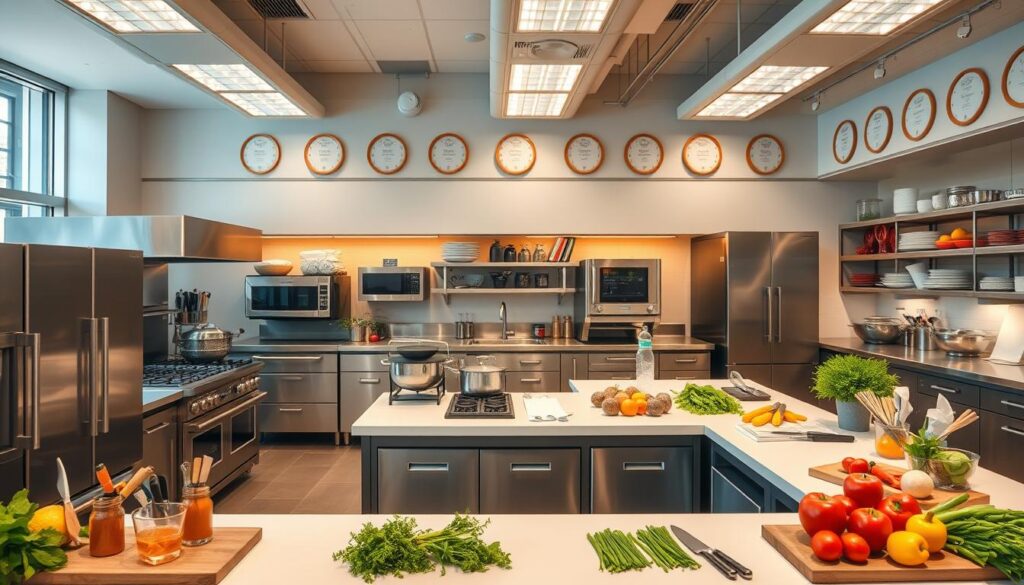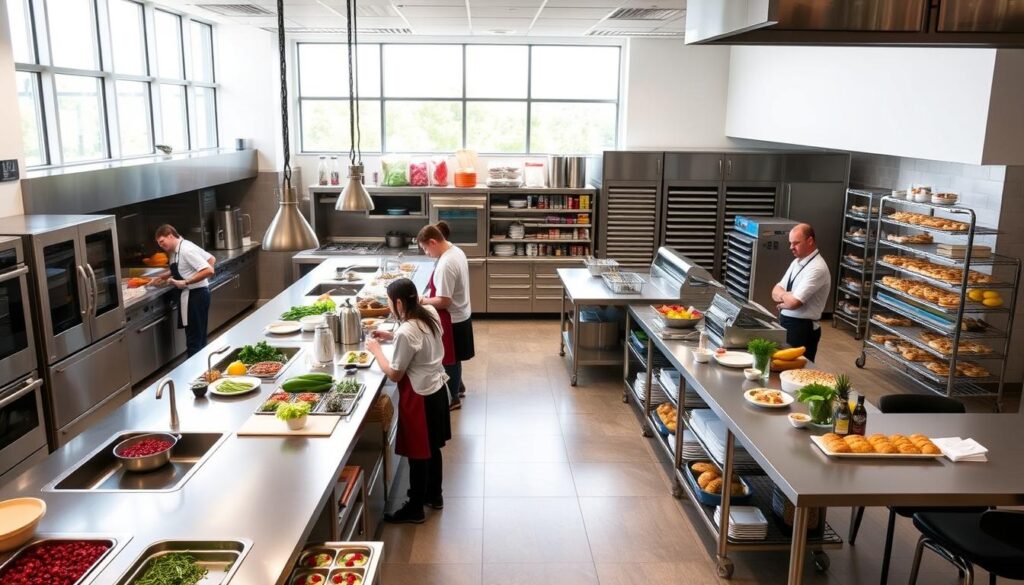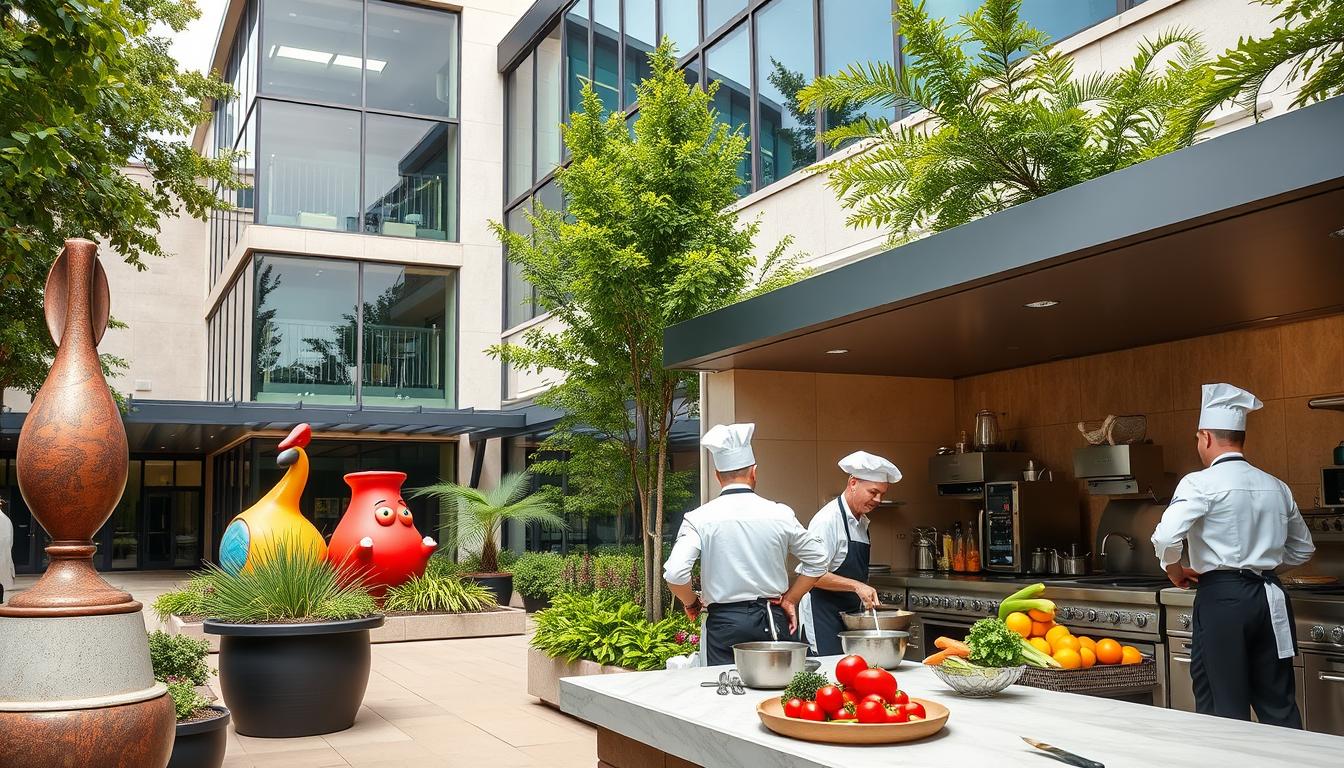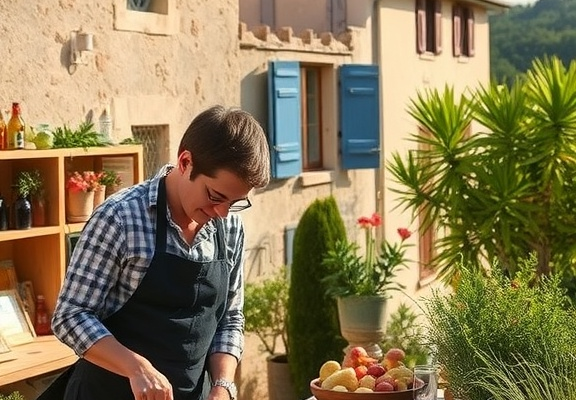Table of Contents
The sizzle of a perfect sear, the delicate balance of flavors, and the artistry of plating—these are the dreams that spark a culinary journey. If you’ve ever felt the passion burning inside to transform your love for food into a professional career, choosing the right culinary arts school is your first crucial step.
Thank you for reading this post, don't forget to subscribe!The United States boasts an incredible landscape of culinary schools that can turn your gastronomic passion into a thriving career. From New York’s prestigious Culinary Institute of America to innovative online culinary degree programs, aspiring chefs have unprecedented opportunities to craft their culinary dreams.
Navigating the world of culinary schools can feel overwhelming. With over 250 accredited institutions across the country, you’ll find programs ranging from traditional campus experiences to flexible online learning options. Each school offers unique pathways to help you develop professional kitchen skills, industry connections, and the expertise needed to excel in the competitive culinary world.
Whether you’re seeking culinary schools in New York or exploring online culinary degree options, this guide will help you discover the best culinary arts schools that align with your professional aspirations. Your culinary adventure starts here—let’s explore the ingredients for your success!
Understanding the Value of Professional Culinary Education
Starting a career in the culinary arts needs more than just passion. It requires professional training. The top culinary schools in America offer more than just cooking skills.

Professional culinary education gives aspiring chefs the skills they need. It’s crucial in today’s competitive food world. Good culinary schools in the US know that success comes from thorough training.
Benefits of Formal Culinary Training
Formal culinary training has many benefits for students:
- Structured learning environment
- Professional kitchen discipline
- Advanced cooking techniques
- Food safety certification
Industry Recognition and Career Advancement
“The structure and discipline emphasized in culinary school are essential to professional development.” – Chef Evan Funke
Graduates from the best cooking schools in the US get recognized. They also get networking and mentorship opportunities. These can really help their careers in the food industry.
Developing Professional Kitchen Skills
Top culinary programs focus on practical skills. They include:
- Advanced knife techniques
- Flavor profiling
- Kitchen management
- International cuisine understanding
Culinary education is an investment in your future. It gives you the foundation for a successful and rewarding career in the culinary world.
The Culinary Institute of America: Leading Culinary Excellence

The Culinary Institute of America (CIA) is a top school for culinary education in America. It was founded in 1946 and has been training chefs for over 75 years. This makes it one of the best culinary schools in the US.
The CIA offers many educational paths for those interested in cooking. Students can pick from:
- Associate degrees in culinary arts
- Bachelor’s degrees in culinary arts
- Baking and pastry arts programs
- Food business management tracks
The CIA is known for its deep dive into culinary education. It has campuses in key locations:
- New York (main campus)
- California
- Texas
- Singapore
Unique opportunities define the CIA experience. The school hosts over 150 top restaurant and hospitality companies for career fairs three times a year. Students get hands-on experience in award-winning restaurants, preparing them for the real world.
“The CIA doesn’t just teach cooking; we create culinary leaders” – CIA Executive Leadership
For those looking to advance their careers, the CIA offers online programs. These programs are designed for the food and hospitality industry. With a strong alumni network and industry connections, the CIA is a top choice for culinary arts enthusiasts.
Essential Features of Top-Rated Culinary Programs
Exploring top culinary schools in the US is key for aspiring chefs. The best cooking schools in America do more than teach basic cooking. They offer full educational experiences that get students ready for a career in the culinary world.

State-of-the-Art Facilities and Equipment
Top culinary schools in America have the latest kitchen setups. These kitchens are like real restaurants, giving students hands-on experience with top-notch equipment. You’ll learn on everything from advanced cooking stations to professional appliances, readying you for culinary challenges.
- Professional-grade kitchen equipment
- Simulation of restaurant environments
- Advanced cooking technology
Expert Faculty and Industry Connections
The quality of teaching makes top cooking schools stand out. These schools hire experienced chefs as teachers. They bring real-world skills to the classroom and often have strong connections in the industry. This means great networking chances for students.
“Your instructors are your first professional network in the culinary world.” – Culinary Education Expert
Hands-on Learning Opportunities
Practical experience is vital in culinary education. The top culinary schools in the US offer:
- Internship programs
- Student-run restaurants
- External training partnerships
- Live cooking demonstrations
Hands-on training is crucial: 52% of culinary managers say an associate degree with experience is key for jobs. With culinary jobs growing 5% by 2032, a full education program can really help your career.
Best Culinary Schools in US: A Comprehensive Guide
Choosing the right culinary school can turn your cooking passion into a career. The US has many top cooking schools. These schools offer great chances to grow your skills and start a successful culinary career.
Looking at top culinary schools in the US, some stand out:
- Culinary Institute of America (CIA)
- Johnson & Wales University
- Institute of Culinary Education
- Auguste Escoffier School of Culinary Arts
These best pastry schools in the US have special programs. They help students get ready for the kitchen. There are good job chances:
- 52% of culinary managers say an associate degree is key
- Job growth for culinary pros is expected to be 5%
- Chefs make an average of $56,520 a year
“Choosing the right culinary school is your first step toward a delicious career” – Professional Chef Association
Program lengths vary, giving aspiring chefs options:
- Certificate Programs: About 1 year
- Associate Degree: Around 2 years
- Bachelor’s Degree: Usually 4 years
When picking a culinary school, think about the teachers, connections, and hands-on training. This ensures you get the best professional preparation.
Specialized Programs and Degree Options
Choosing the right culinary school program is key to your career. The culinary world offers many paths for those wanting to grow in the field. Top culinary schools in the US provide diverse options.
There are many ways to start your culinary journey. Each path is designed to fit your goals and how you learn best.
Associate and Bachelor’s Degree Programs
Culinary school offers degrees for future chefs. Programs include:
- Two-year Associate degrees in Culinary Arts
- Four-year Bachelor’s degrees in Culinary Management
- Specialized tracks in pastry arts and restaurant operations
Certificate and Diploma Courses
Certificate programs focus on specific skills. They are offered at some of the best pastry schools in America. These programs last from 3-6 months and are very intense.
- Professional culinary certificates
- Specialized baking and pastry diplomas
- Short-term professional skill enhancement courses
Online Learning Opportunities
Digital education has changed culinary learning. Many top 10 culinary schools in the US now have online programs. These programs are great for working professionals and students.
“The future of culinary education is flexible, accessible, and tailored to individual learning needs.” – Culinary Education Expert
When picking a culinary school, think about program length and specialization. Also, consider how each path fits your career goals in the culinary arts.
Johnson & Wales University: Excellence in Culinary Arts
If you love cooking and want a top education, Johnson & Wales University (JWU) is the place to be. It’s known as one of the best culinary schools in the U.S. JWU’s programs turn students into expert chefs.
“JWU isn’t just a culinary institute; it’s a launchpad for future culinary innovators.” – Culinary Education Quarterly
The university has campuses in Providence, Rhode Island, and Charlotte, North Carolina. These places offer unique cooking experiences. JWU is known for its creative culinary education.
- Ranked #2 Best Culinary Arts School by College Factual
- Named a 2025 Most Innovative School by U.S. News & World Report
- Over 50 years of culinary education experience
JWU’s cooking classes teach more than just how to cook. Students learn theory and get hands-on experience. They learn about sustainability, business, and new cooking trends.
| Program Highlights | Details |
|---|---|
| Campus Locations | Providence, RI | Charlotte, NC | Online Options |
| Degree Options | Associate, Bachelor’s, Certificate Programs |
| Notable Alumni | Emeril Lagasse, Tyler Florence |
With a 99% financial aid rate and connections to famous chefs, JWU is a top choice. It’s perfect for those who want to be chefs or start a food career. JWU gives you the skills, knowledge, and connections to succeed in the culinary world.
Location and Campus Experience Considerations
The campus location is key in culinary education. It shapes your learning experience. The right place can boost your skills and connections in the kitchen.
Different culinary institutes offer unique campus experiences. These can change your educational path. Think about these factors when choosing your school:
- Urban vs. Rural Campus Settings
- Local Food Culture and Industry Connections
- Specialized Kitchen Facilities
- Networking Opportunities
“Your campus is more than a location – it’s the foundation of your culinary journey.”
The Culinary Institute of America shows the importance of location. With campuses in New York, California, Texas, and Singapore, students see different culinary worlds. Napa Valley’s campus, for example, offers a deep dive into a top food and wine area.
| Campus Location Benefits | Key Advantages |
|---|---|
| Urban Campuses | Direct industry connections, multiple restaurant experiences |
| Rural Campuses | Close agricultural connections, farm-to-table learning |
| Specialized Regions | Unique culinary traditions and local food culture |
Your campus choice greatly affects your culinary education. Look for schools with full experiences. They should have student-run restaurants, modern kitchens, and strong ties to the industry.
Financial Investment and Return on Education
Getting into culinary arts needs smart money planning. You’ll dive into the world of hospitality and pastry arts. It’s important to know the financial side of culinary education.
Different schools charge different prices for culinary education. Top schools are a big investment in your career.
Tuition Costs and Financial Aid Options
Tuition at culinary schools varies a lot. Here are some financial points to think about:
- The Culinary Institute of America costs $52,090 per academic year
- Federal student loans are available for eligible students
- Work-study programs can help offset campus expenses
- Community colleges offer more affordable culinary training options
Scholarship Opportunities
There are many scholarships for those who want to be in the culinary world:
- Institutional scholarships from culinary schools
- Industry-specific culinary scholarships
- Minority and diversity-focused financial support
- Merit-based awards for exceptional students
Career Earning Potential
| Career Path | Average Starting Salary | Mid-Career Potential |
|---|---|---|
| Pastry Chef | $45,000 | $65,000-$85,000 |
| Restaurant Chef | $42,000 | $70,000-$90,000 |
| Executive Chef | $55,000 | $90,000-$120,000 |
“The right culinary education can be your passport to a rewarding and lucrative career in hospitality.” – Professional Chef Association
Remember, while education is an investment, practical experience and passion are equally crucial in your culinary journey.
Industry Connections and Alumni Networks
Getting ahead in the culinary world is not just about a degree. Your success also depends on your professional network and connections. Top culinary schools know this is key for your career growth.
“Your network is your net worth in the culinary industry” – Professional Chef Mentor
The best culinary programs have strong alumni networks. These networks give graduates big advantages in a tough job market.
- Direct job placement opportunities
- Mentorship from established professionals
- Hands-on industry introductions
- Insider knowledge of emerging food trends
Schools like the Culinary Institute of America (CIA) have huge alumni networks worldwide. Their graduates get support from a vast network of professionals.
| Culinary School | Alumni Network Strength | Job Placement Rate |
|---|---|---|
| CIA | Extensive Global Network | 85% |
| Johnson & Wales | Strong Industry Connections | 78% |
| Institute of Culinary Education | Robust Professional Links | 82% |
When picking a culinary arts program, look at the school’s connections. These networks can turn your education into a springboard for a great culinary career.
Student Life and Practical Experience
Studying culinary arts is more than just sitting in class. It’s a chance to dive into real-world experiences. These hands-on moments turn your love for cooking into valuable skills.
At top culinary schools, you get to do a lot of practical training. This training is designed to get you ready for a career in the culinary arts. You’ll get to:
- Work in student-run restaurants
- Join in regional and national competitions
- Go to food industry events
- Work with different kitchen teams
The Culinary Institute of America shows what this looks like. They have three student-staffed restaurants on campus. Students get real-world experience before they even graduate. An alumnus can expect to learn:
- How to work in a professional kitchen
- From mentorship programs
- Through culinary challenges
“Practical experience is the cornerstone of culinary education. It transforms theoretical knowledge into professional expertise.” – Chef Professional
Your culinary education will push you to grow in many ways. You’ll learn new skills and get creative. You’ll also join clubs and activities that help you meet people in the industry. This network will help you after you graduate.
Conclusion
Choosing the right culinary arts program is a big decision. It can shape your future as a professional chef. Schools like the Culinary Institute of America and Auguste Escoffier offer many options. The best school for you depends on your goals, learning style, and career dreams.
Top culinary institutes teach more than just cooking. They cover food safety, nutrition, and business. Tuition can range from $5,000 to $50,000. Think about the return on investment and career opportunities in restaurants and hotels.
Look for schools accredited by the American Culinary Federation. Scholarships from the James Beard Foundation can help with costs. Your culinary school is a key step in your chef career.
Visit campuses, talk to students, and check out each school’s offerings. Your ideal culinary education is waiting. It will turn your food passion into a fulfilling career.






